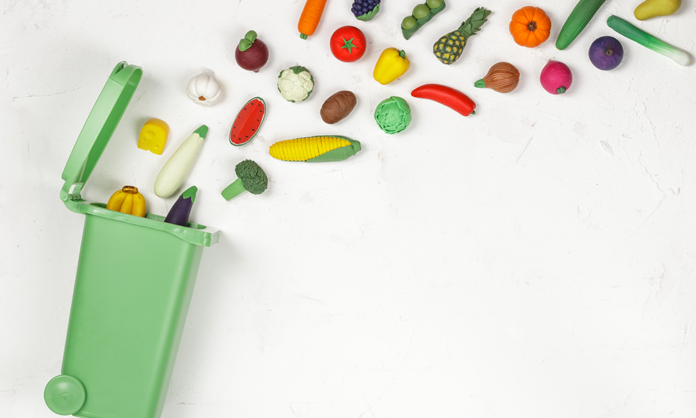The second annual Food Waste Action Week begins Monday 7 March. It will raise people’s awareness of the huge impact of household food waste on climate change and share practical advice, food savvy behaviours and tips on how we can all easily reduce the food we waste in our homes.
We throw away 6.6 million tonnes of household food waste a year in the UK. This food waste is responsible for nearly 25 million tonnes of CO2 emissions, equivalent to 5.4% of the UK’s territorial emissions. The majority, 4.5 million tonnes is food that could have been eaten and is worth approximately £14 billion (or £60 a month for an average family with two children). It requires an area almost the size of Wales to produce all the food and drink currently wasted in the UK.
GMCA will be supporting Food Waste Action Week across social media, digital advertising and on the Recycle for Greater Manchester (R4GM) website. The GMCA will also be working with the nine local authorities across the city-region that form the waste disposal authority to raise awareness of the campaign with residents.
R4GM is committed to helping residents waste less at home and recycle right, and during Food Waste Action Week will be sharing tips and information from Love Food Hate Waste to help inspire residents to take small actions to reduce the food they throw away. This week supports an ongoing campaign (Buy Keep Eat Repeat) from R4GM to raise awareness around the link between food waste and climate change and encourage residents to reduce their food waste as much as possible.
Cllr Neil Emmott, GMCA Lead for the Green City-Region said: “Greater Manchester Combined Authority, working with our 10 local councils, is proud to support Food Waste Action Week.
“Climate change is already having a devastating effect on weather across the world, from melting ice caps to bushfires. We can also see the effects here in Greater Manchester with flooding and storms causing major disruption across our region.
“Wasting food has a huge impact on climate change. We can all do our bit to prevent food waste by planning our meals, storing food properly and using leftovers. With around 2.8 million residents living across Greater Manchester, if every one of us took simple steps to reduce the amount of food we throw away, we could make a real difference.”
Love Food Hate Waste runs an annual survey of people’s habits and knowledge around food waste. This highlighted that 81% of UK citizens are concerned about climate change, but only 32% see a clear link with food waste. The survey helped to inform the theme of the Week and the development of materials to motivate people to act. This year, Love Food Hate Waste found that the public’s relationship with its freezers has become particularly frosty with many people not knowing how to safely freeze and defrost their food.
Sarah Clayton, Love Food Hate Waste, said: “Getting to grips with freezing and defrosting are big factors in preventing food from going to waste at home. At a time of rising food prices alongside huge public concern about climate change, tackling food waste at home is one way we can all make a difference and save money. For the average family with children, the cost of binning food can be more than £700 per year. So, Food Waste Action Week is all about avoiding being savvy in how we store but then use our food.”
Love Food Hate Waste is keen to show that used properly, the freezer is the king of the kitchen. In fact, freezing and defrosting just three key meat items that are commonly not used in time (fresh chicken, bacon, and sausages) could reduce waste of those items by as much as 15,000 tonnes per annum. And, when it comes to defrosting, busy households can avoid a lengthy overnight defrost by using their microwave instead – as people use a toaster to defrost sliced bread from the freezer.







